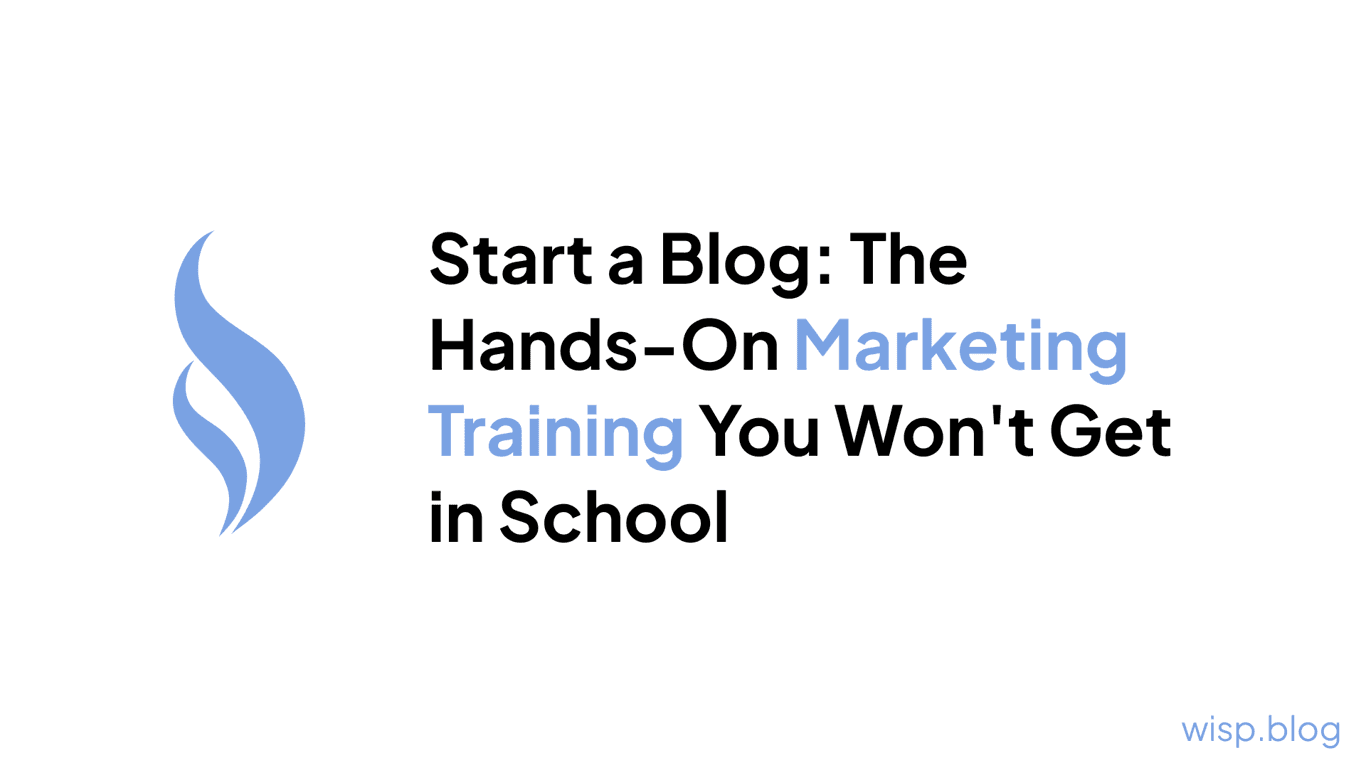
You're a recent marketing grad, eager to launch your career and put those four years of learning into practice. But as you start applying for jobs, you quickly realize there's a major disconnect between what you learned in the classroom and the actual technical skills employers want.
You were taught all about the 4 P's, consumer behavior theory, and high-level marketing strategy. But when it comes to executing modern, data-driven marketing campaigns using the latest tools and technologies, you feel completely underprepared. How are you supposed to run effective digital ads, build automated nurture sequences, or optimize websites for conversions when you never learned any of those practical, in-demand skills?
It's frustrating - you worked so hard, took on student debt, and chose marketing because you were passionate about creative, innovative work. But now you're stuck treading water, applying to entry-level roles that still seem to require years of experience you simply don't have.
You can't help but feel a little misled. You were sold on the idea that a marketing degree would prepare you for the real world and make you an attractive hire. But the reality is, most job postings are littered with technical requirements your coursework never covered. It's like you missed out on the entire toolbox needed to actually do the work.
What if I told you that you're far from alone in this frustrating predicament? The disconnect between academic marketing curriculums and the practical, technical skills businesses need is extremely widespread. In their haste to teach traditional theory and concepts, most university marketing programs are failing to equip students with the modern, digital skill set the workforce now demands.
The 7 Technical Skills Marketing Grads Are Missing
Here are 7 key technical skills that are glaringly missing from most marketing degree programs, but are absolutely essential for launching a successful career:
1. Marketing Automation & CRM Mastery
In today's world of personalized customer journeys and nurture campaigns, marketing automation platforms like HubSpot, Marketo, and ActiveCampaign are the lifeblood of customer communication. Yet, very few students graduate with any real experience using these powerful tools to build automated sequences, score leads, and integrate with CRMs.
Why It Matters: Automation skills are a game-changer for increasing marketing efficiency, scalability, and ROI. With the ability to nurture prospects through triggered email sequences, score and prioritize leads based on engagement, and seamlessly sync data between your CRM and marketing channels, you'll be seen as a revenue-driving asset from day one.
Get Ahead: Prioritize learning one or two major marketing automation platforms inside and out. Take certification courses, watch tutorial videos, and practice building nurture sequences and lead scoring rules. Having this hands-on experience will make you an extremely competitive candidate.
2. Analytics & Data Skills
The rise of digital marketing has made data and analytics indispensable for understanding campaign performance, user behavior, and ROI. However, most programs only scratch the surface of tools like Google Analytics, Data Studio, and techniques like A/B testing and conversion tracking. True data fluency is a must for making informed, metrics-driven decisions.
Why It Matters: Marketing without data is like driving with a blindfold on. You need to be able to measure, analyze, and iterate based on hard numbers and user insights. Employers want marketers who can go beyond vanity metrics and dive deep into the numbers to uncover opportunities and areas for optimization.
Get Ahead: Become an expert in Google's analytics products by earning certifications. Learn how to set up custom dashboards, goals, and funnels to track key metrics. Practice running A/B tests and using tools like Hotjar to understand user behavior. Build reports and data visualizations to showcase your analytical skills.
3. Paid Advertising Proficiency
The ability to run and optimize paid advertising campaigns across channels like Google Ads, Facebook/Instagram, LinkedIn, and programmatic networks is hugely valuable. Unfortunately, many students only learn basic digital marketing concepts rather than hands-on paid ads skills using live platforms and ad accounts.
Why It Matters: Paid advertising is the fuel that drives new customer acquisition for most businesses. Having the skills to strategically manage ad budgets, target the right audiences, create compelling ads, and measure ROAS is absolutely crucial. Paid marketing roles are both lucrative and in incredibly high demand.
Get Ahead: Open ads accounts across Google, Facebook, LinkedIn, and other platforms to start practicing. Run low-budget test campaigns, learn the platforms inside and out, and build case studies to showcase your paid ads skills. Earn platform certifications and learn advanced techniques like audience targeting and campaign restructuring.
4. Content Management Systems (CMS)
In the digital age, every organization needs a robust online presence powered by a CMS like Wisp, WordPress, or Ghost. Surprisingly, most marketing programs don't cover how to actually build, manage, and optimize websites using these ubiquitous platforms. This is a major missed opportunity.
Why It Matters: The ability to create, publish, and optimize content on a CMS is a core part of content marketing, SEO, and driving inbound traffic. Companies need marketers who can independently manage their web presence and create high-converting landing pages, blogs, and website content without relying on developers.
Get Ahead: Check out Wisp, a modern headless CMS built specifically for marketers and content creators. With its intuitive editing experience and seamless integration with tools like Next.js, Wisp makes it easy to launch your own marketing blog or portfolio site. The blog has great tips on building a marketing portfolio that showcases your skills, and even provide a free blog starter template so you can get up and running quickly.
5. Graphic Design & Video Editing
Visual content like graphics, images, and video are the backbone of modern marketing. Yet, many students graduate without any real experience using essential tools like Canva, Adobe Creative Cloud, iMovie, or Final Cut Pro to create engaging visuals from scratch. This leaves them reliant on outsourcing design work.
Why It Matters: Visuals are the language of the modern attention economy. Having graphic design and video editing skills allows you to create thumb-stopping social media content, design beautiful digital ads and landing pages, and produce compelling video marketing assets - all in-house. This versatility is extremely valuable.
Get Ahead: Become an expert in user-friendly tools like Canva for graphic design and iMovie/Lumen5 for video editing. Learn fundamental design principles like color theory, typography, and layout. Practice creating visuals for real marketing use cases like social posts, ads, infographics, and more to build a portfolio. Having these skills differentiates you.
6. Coding & Web Development
While you don't need to be a full-stack developer, basic coding skills in HTML, CSS, and JavaScript can be invaluable for customizing websites, landing pages, emails, and more. Unfortunately, most marketing curriculums treat coding as an elective rather than a core requirement, leaving grads without this versatile skill.
Why It Matters: Even basic web skills allow you to be more self-sufficient and move quicker without relying on engineering resources. You'll be able to QA and make simple tweaks to web properties, landing pages, and emails. You'll understand how the web works under the hood. This makes you a more well-rounded, effective digital marketer.
Get Ahead: Focus on front-end skills - HTML, CSS, JavaScript. Build basic websites from scratch. Learn how to integrate with APIs and CMSs. Customize email templates. Having these skills lets you create on-brand, frictionless user experiences without being blocked. It's a true marketing force multiplier.
7. Project Management & Collaboration Tools
With marketing being such a cross-functional team effort, project management skills and fluency with tools like Trello, Asana, Airtable, Slack, and Google Workspace are crucial. However, many students miss out on learning these vital collaboration skills for keeping campaigns and initiatives organized and on track.
Why It Matters: Marketing is the ultimate team sport, with many moving pieces and stakeholders. You need to be able to plan projects, coordinate tasks, communicate seamlessly, and keep work organized. Employers want marketers who can be force multipliers for productivity and execution.
Get Ahead: Learn best practices for project/task management using tools like Trello or Asana. Become a Google Workspace/Microsoft Office power user. Use Slack, Zoom, Loom, and other apps to collaborate effectively. Having these skills shows you can be a glue that holds marketing operations together.
Check out this post on networking hacks to find mentors who can share their favorite tools and workflows.
Bridging the Gap Between Academics and Real-World Marketing
The bottom line is, while marketing degrees can provide a solid foundation in theory and strategy, they often fall short in equipping students with the hands-on technical skills to truly thrive in today's digital-first roles.
The good news? With some self-directed learning and a commitment to building your modern marketing toolkit, you can easily fill those gaps and become a well-rounded, highly employable candidate. Invest time into mastering the skills above through online courses, certifications, personal projects, and internships. The effort will pay dividends in helping you hit the ground running and stay ahead of the curve in your marketing career.


